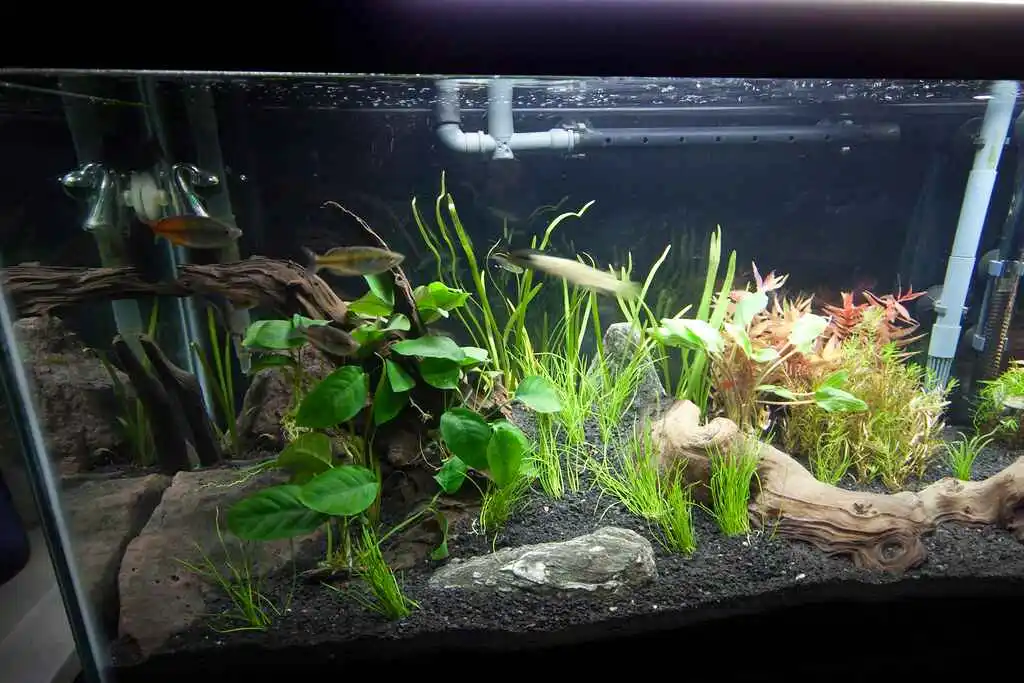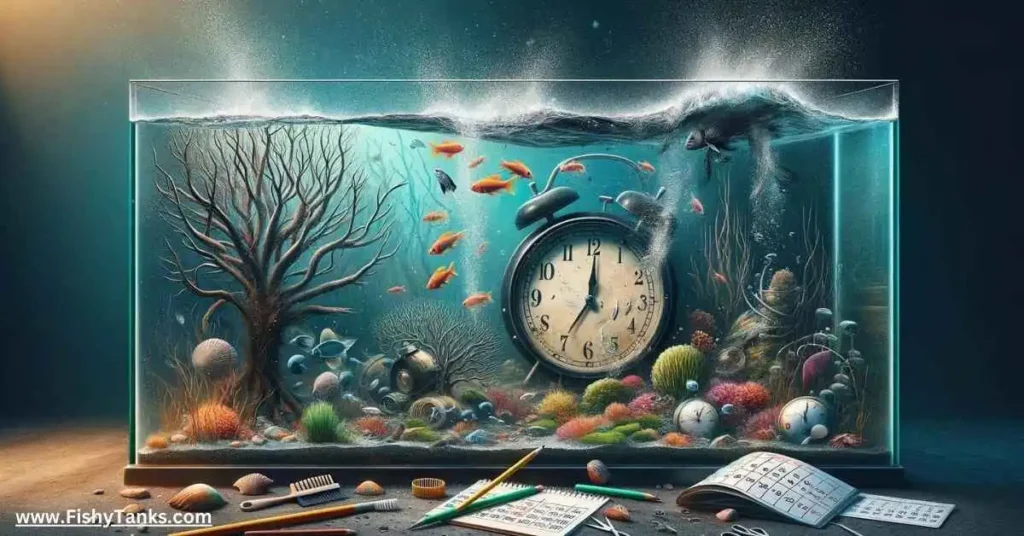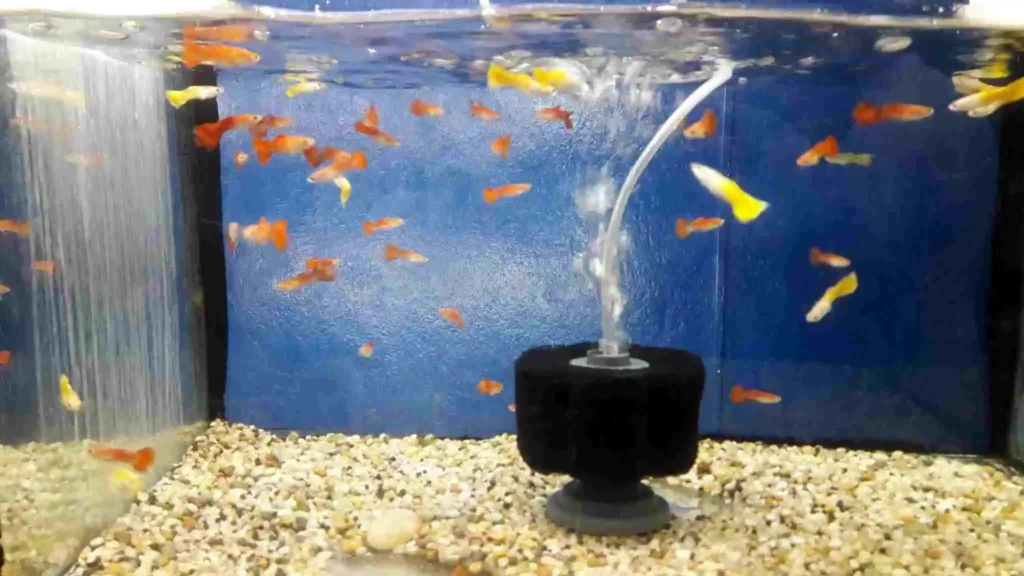
Introduction
There is probably no factor within the aquarium keeping more important than filtration systems for properly keeping aquatic life healthy. These devices do all the dirt without us seeing them. They remove the waste and toxins, as well as the excess nutrients from the water.
How long can a fish tank go without a filter? On the other hand, what if this important thing was no longer there for some reason? How many days can a fish tank keep the equilibrium between different species without the benefit of filtration? Be with us in these explorations as we investigate what causes the upset of water conditions and how the experts cope with these disasters.
Through such an acknowledgment of the forces that affect them, we show ourselves that we are capable of helping our aquatic subjects to survive even in undesirable conditions.

Role of Filtration of a Fish Tank
Filtration stands quietly behind the scenes doing the unrecognized job of aquarium care, probably making hundreds of the tiniest adjustments to maintain the balance of the aquatic ecosystems. Can a fish tank go without a filter through filtration of waste, chemicals, and all the undesirable things, purification systems are created to keep the water very clean and perfect for fish and other aquatic species to live in.
Furthermore, liquid filters contribute to the aeration of oxygen and circulation of water, which especially allows aerobic bacteria to thrive and keep the environment hospitable for aquatic life. Absent these mechanisms, the homeostasis of the aquarium environment is questioned, and the latter’s potentially negative cascades can be seen. Therefore, grasping the unique role of filtration has to be seen as the primary goal of aquarists who are striving to develop and maintain healthy aquatic ecosystems.

Factors Affecting the Duration Without a Filter
Tank Size
Bigger tanks typically hold a larger water volume which increases the time before the water quality begins to become degraded.
Fish Population
The fish excreta along with the human wastes discharged in the waterways mainly determine the rate at which water quality is being degraded.
Type of Fish
Different invertebrates discharge different amounts of waste, and they also have their oxygen uptake, so the longer they live without filtration depends on it.
Live Plants
Placement of live plants in the aquarium may aid in natural filtration, which could be achieved by extending the lifespan of the aquarium without a filter
Maintenance Practices
Routine maintenance which encompasses the removal of algae and sucking out platinum results in the removal of waste and debris with the filter absence.
Water Parameters
Water parameters monitoring and maintenance of pH, ammonia, nitrite, and nitrate become very critical issues with deficiency of filtration or no filtration.

Temperature Control
Maintaining a constant water temperature is an important factor for the quality of the life of the fish because the rapid temperature changes can aggravate the stress of the fish and reduce the damage to the immune system of the fish.
Emergency Preparedness
As a backup measure, an additional filter or aerator is necessary to be able to quickly fix the filtering system failure so that the aquarist can implement the solution as soon as possible and reduce the amount of harm that might come to their aquatic inhabitants.
Signs of Poor Water Quality
Monitoring water quality becomes more meaningful at the very moment when water starts to deteriorate. Can a fish tank go without a filter? One of the usual ways to recognize water pollution is by detecting the water has an unusual color because there’s dirt in the water body, some unpleasant smell, behavior changes of fish, or the presence of algae. Such indicators demonstrate the necessity to undertake emergency measures to limit the damage to those pet sub-organisms. However, in addition to these visible indicators, measuring the water quality parameters like ammonia, nitrite, nitrate, and pH is beneficial in a quest to uncover in detail the overall health of the aquarium situation.
The pollutants such as ammonia and nitrites that enter the water from human sources indicate a broken nitrogen cycle and the spread of the fish and other organisms can be disrupted by changing the pH. Not only it will serve as a hint about the condition of the water, but observing the behavior of fish also can reveal something about its parameters. Disorders visible on the face, like breathing at the water surface, hostile behavior, and laziness may suggest unsuitable water conditions.

Strategies for Maintaining Water Quality Without a Filter
- Regular Water Changes: Appropriate water change is very important in order to dilute the waste and to ensure that the water parameters are in the acceptable range.
- Mechanical Filtration Alternatives: Employment of short-lived mechanical filtration techniques involving sponge filters and filter floss may successfully compensate for the adverse effects of no filtration at all.
- Biological Filtration Methods: The application of favorable microbes into introduced media or commercially available bacterial supplements can support the digestion of wastes and nitrogen turnover.
- Emergency Measures: Fast action from the staff is vital if there is a filter system failure. Keeping a till-sort backup system for filtration or doing regular water changes can effectively minimize the first effect on water quality.
- Aeration Devices: Implementing airstones or air pumps as well as providing oxygenation as a way to replace the filter and support aerobic bacteria.
- Activated Carbon: Using activated carbon for the purification of water can remove organic compounds and toxins from that water thus improving its quality.
- Reduced Feeding: Using a small portion of the food can lower waste creation and improve the aquarium’s ecosystem.
- Aquarium Plants: Introducing natural plants into aquariums is another effective way of absorbing nutrients and producing oxygen which will, in turn, improve the filtration process and maintain water clarity at optimum levels
Natural Filtration Approaches
Natural filtration embodies using the natural power of nature to disinfect water quality from the tank can a fish tank go without a filter? Regarding the ways of prevention, some of us use live plants which can absorb nutrients and oxygen and as the result of algae growth and waste accumulation. Also, using materials substrate made of gravel or sand can provide habitats where the bacteria helpful in removing the organic material can live on.
One of the natural options to adhere involves making sure there is an existence of aquatic animals such as snails and shrimps which all help in consuming any excess algae and detritus. Maintaining a healthy aquarium entails making a natural water filtration cycle work by balancing the ecosystem and creating a population of diverse organisms that would represent and simulate natural processes. These practices are considered green alternatives to common filtering systems, so they also promote the development of ecologically favorable water systems to create a living environment cleaner for water life.

Beneficial Microorganism Communities
Maintaining the correct population of good microbes is surrounded by many elements that keep water quality good in aquariums. A work of these strains includes various microorganisms like nitrifying microbes, which involve the nitrogen cycle process turning toxic ammonia and nitrite into less harmful nitrates into a usable compound. Can a fish tank go without a filter? Similarly, good members of the bacterial colony will come to roost on certain surfaces in the tank like filter media, substrate, and decoration where they promote the degradation of the organic compounds and the detritus.
The aquarists can make it possible to have and retain a large number of microorganisms, which will ensure the biological filtration process for the fish in the aquarium and the desirable stability of the aquatic environment. Systematic maintenance routines, such as indicating not over-cleaning of filter media, can sufficiently maintain intact microbial communities. Essentially, utilization of the positive qualities of the microbes can be a safe and remarkable technique for elevating water quality in home aquariums.
Case Studies and Experiments
Various trials, which are conducted in different ways, are good sources for the study of the survivability of fish tanks with no filtration. These examples give a good idea of why no filtration rules are absent and how active controlling actions can achieve the best results.

Conclusion
The question of how long a fish tank without a filter can last is not only a life and death of pet fish but also an acknowledgment of our duty as aquarists to ensure the stability of aquatic ecologies. Can a fish tank go without a filter? Through knowledge of the things that make water quality poor, encoding of the signs of going bad, and ready solutions to the captiring we will bumguard the health and wellbeing of the ones you lots in the water. Regardless of whether regular maintenance, emergency preparedness, or filtration which comes from nature is the case, there are actionable strategies that will eventually minimize filter deficiency.
Being the supervisors of such undersea inhabitants, we must be knowledgable and flexible in our aquarium carpeting program, in turn making sure that our fish love their ‘homes’ which are similar to the ones they were, to begin with. Without this persistence, experience, and common goal of being, we will create the best home aquatic ecosystem on the planet that will demonstrate our love for the hobby and our commitment to everyone in the aquatic life.
FAQ’s
1. How Long Can Fish Survive Without a Filter in a Tank?
The question relates to an issue that people running aquariums usually come across namely, the defective functioning of filters and the faulty working of filtration systems.
2. What Are the Signs of Poor Water Quality in a Fish Tank?
Aquarists usually need to determine the visible signals of alarm that can help them treat the water conditions appropriately and keep a healthy marine item.
3. What Strategies Can I Use to Maintain Water Quality Without a Filter?
Here lies the query concerning the technological advances that take place when filtration systems do not function or could be impaired by factors leading to impaired water quality.
4. Are There Natural Filtration Methods I Can Implement in My Aquarium?
The high interest of many house aquariums in eco-friendly ways of keeping water quality leads to numerous inquiries about the effectiveness and trials of natural methods for filter setup.
Must Read: What Fish Can Live With Turtles In a Tank?